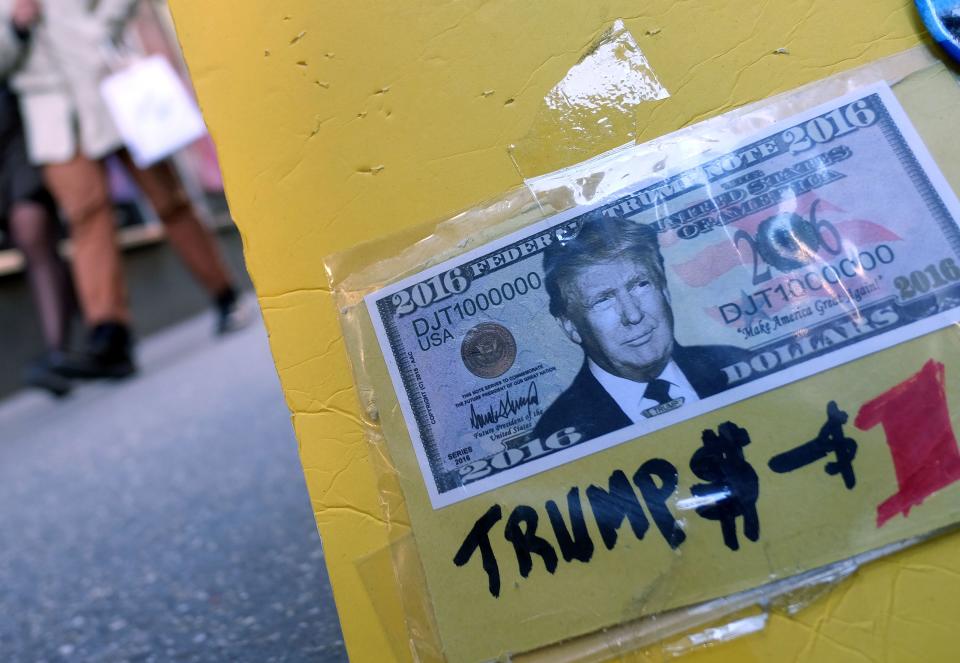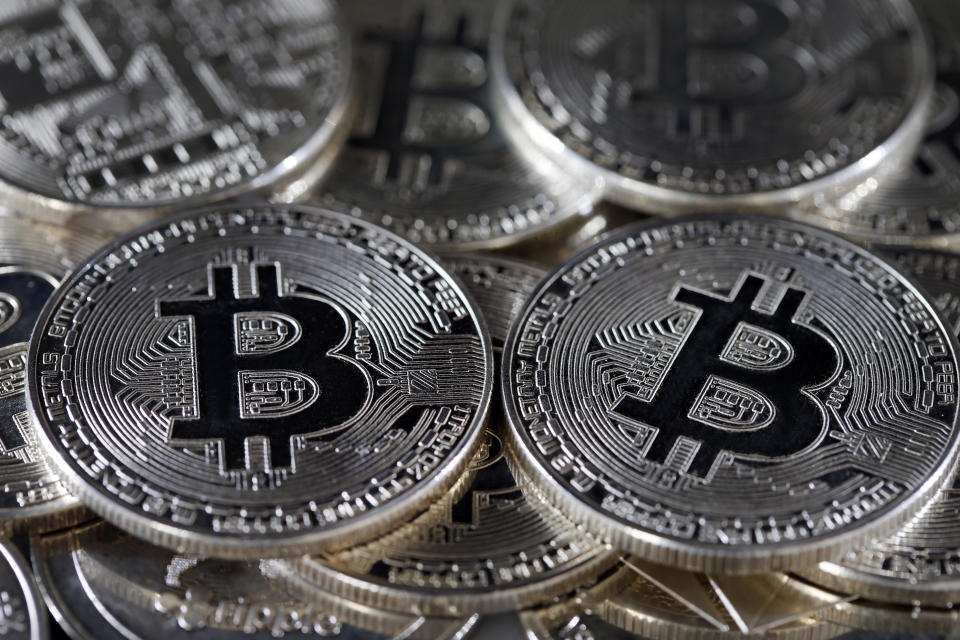Donald Trump's bitcoin takedown signals global currency war
US President Donald Trump’s tweet attacking bitcoin (BTC-USD) highlights his increasing interest in controlling global currency markets — an interest that could create a “new world order” in foreign exchange.
Trump last Thursday attacked cryptocurrencies such as bitcoin and Facebook’s (FB) Libra, saying in a tweet that they are “highly volatile and based on thin air.”
While the global press immediately jumped on Trump’s first public mention of cryptocurrencies, what went largely unnoticed was a follow-up tweet.
“We have only one real currency in the USA, and it is stronger than ever, both dependable and reliable,” the President tweeted. “It is by far the most dominant currency anywhere in the World, and it will always stay that way. It is called the United States Dollar!”
Trump’s interest in bitcoin and reassertion of the dollar’s dominance highlights the President’s increasing interest in currency markets. HSBC and ING both told clients last week that the US could be gearing up for broader intervention in global currency markets.
The reason? Foreign exchange risks derailing Trump’s efforts to correct US trade imbalances and boost the domestic economy.
‘New world order’

The most striking thing about Trump’s economic policy is his willingness to slap tariffs on major trading partners. China has been his biggest target as the President seeks to rebalance trade between the two superpowers.
However, US tariffs can be undermined by moves in currency markets.
“When President Trump, on 30 May this year, announced he could impose incrementally higher tariffs on Mexico’s exports to the US, beginning with a 5% tariff on 10 June, the MXN weakened close to 5% in the following two days,” HSBC wrote in a note to clients last week.
Market dynamics dictate that the currencies of export-driven economies will tend to devalue against the dollar in response to tariffs. Often the devaluation is big enough to essentially wipe out the impact of the new taxes.
“President Trump’s preferred medicine for addressing the US trade imbalance has created a naturally occurring side-effect of a stronger USD that the administration believes is preventing his medicine from working,” HSBC said.
The solution? Force trading nations to keep their currencies broadly in-line with pre-agreed exchange rates.
“The Administration is calling for foreign-exchange clauses as a backstop in every new trade deal it strikes,” HSBC said. These clauses would ban countries from “competitive devaluations and currency manipulation.”
The US has already inserted a clause to this effect in the renegotiated NAFTA treaty with Canada (CAD=X) and Mexico (MXN=X). The US is currently trying to negotiate new trade deals with Japan (JPY=X), China (CNY=X), and the EU (EURUSD=X), all of which could have similar clauses. A post-Brexit trade deal is also on the horizon (GBPUSD=X).
“Together, these currencies account for 80% of FX turnover according to BIS data,” HSBC said. Adding currency clauses to all of these deals would create a “new world order,” the bank said.
In this “new world order,” currency market volatility would be limited but economic volatility would increase. If countries can’t devalue their currencies to be competitive, then economies would suffer as exports fall or imports become less affordable.
“If currency clauses were to become a common element within future trade deals, it would change the dynamics of the FX market,” HSBC concluded.
‘Currency war’

HSBC isn’t the only bank seeing changes in US foreign exchange policies.
ING’s head of FX strategy Chris Turner told clients that we could be entering a US-led “currency war.”
“Instead of the global investment story being one of diverging cycles and growth differentials, converging economic cycles could actually see the return of a currency war,” Turner and his team wrote. “It seemed an outrageous suggestion only a short time ago, but US frustration could even result in the President considering FX intervention to weaken the dollar.”
The President has repeatedly called on Federal Reserve chair Jerome Powell to cut the US interest rate, which would help to weaken the dollar internationally.
“The need for a weaker dollar to play its role in the US reflation story is giving investors’ confidence that the eight-year dollar bull-run may be over,” Turner said.
In this context, Trump’s sudden interest in cryptocurrencies makes sense.
While still a niche market, the concepts behind cryptocurrencies present an existential threat to his desire to control foreign exchange.
“As usage of foreign e-money spreads, the domestic unit of account could switch to that in which e-money is denominated,” the IMF said in a paper published on Monday.
In a worst case scenario, the US could find itself in a bitcoin-based economy. Unlike for example the renminbi or pound, bitcoin is controlled by no one central authority that the US can lean on to control exchange rates.
Of course, this is a highly unlikely scenario. But Trump will want to get on top of this growing markets before it poses a threat — particular when Goliath’s like Facebook are close to printing their own private sector money.
China, which has strict currency controls, has already stepped in to stop bitcoin undermining capital controls. It banned bitcoin trading in 2017. Observers said at the time that the bans was linked to concern bitcoin was being used to move money out of China.
While the US example is different, cryptocurrencies still have the potential to undermine Trump’s monetary policy. The President is therefore keen to remind people there is “only one real currency in the USA” — and it’s not bitcoin or Libra.
————
Oscar Williams-Grut covers banking, fintech, and finance for Yahoo Finance UK. Follow him on Twitter at @OscarWGrut.
Read more:
Mark Carney fuels IMF job speculation by refusing to rule it out
Bank of England's Carney warns Libra: 'This is not learning on the job stuff'
Patisserie Valerie auditor put in special measures by UK regulator

 Yahoo Finance
Yahoo Finance 